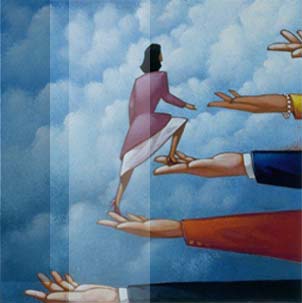Granted the article is old but the source is the Washington Post.
By Yaida Ford
In an age that seems marked by a constant search for meaning, too few people see the tremendous value in investing in another. When I see how many young black men fall prey to low expectations, getting caught up in addiction or the criminal justice system, I have to wonder why more stable, positive black male role models don't reach out and mentor them.
A mentor is not a surrogate parent, a shrink or an ATM. A mentor, as mentoring groups often put it, is just a "wise and trusted friend and guide." Anyone can do it. But according to D.C. organizations looking for mentors, too few black men are willing.
Groups such as Concerned Black Men and 100 Black Men are committed to the training of respectable young men who otherwise may get little responsible male guidance. Unfortunately, they have something else in common: an inability to engage significant numbers of male mentors for the scores of young men looking for help. Why?
A representative from Concerned Black Men told me about the difficulty the group has finding men for their mentorship program. In one program, CBM has 83 young mentees but just 12 male mentors. She attributed the shortfall to several attitudes. Some men feel that they cannot add value to a kid's life. Others insist that they either cannot commit the time needed or that they cannot relate to at-risk youths. Such explanations either come from a misunderstanding of what it means to mentor -- or they are just plain excuses.
Mentoring does not take much time. Some programs ask for all of 96 hours a year, leaving 8,664 for whatever else life demands. The claim of not being able to "relate" is belied by the fact that white men and women often step in to mentor black youths in the absence of suitable black mentors. Anacostia's Thurgood Marshall Academy proves this.
Thurgood Marshall has a mentorship program for its students. One-hundred percent of the school's students are black, but for the past few years almost 70 percent of the mentors have been white. TMA boasts a 100 percent college admission rate for its graduates, and its mentorship program makes all the difference. But why, in a city boasting a new black president, Howard University, black professional and trade associations galore, black sororities and fraternities, churches and other groups, does TMA have so few black mentors? Something is wrong.
What can be done? Mentorship must be promoted heavily within the community, particularly in the business sector. It is a valuable tool that, if done consistently, can have an impact on not only individuals but entire communities. If I were a black man, I would see how mentoring could help reverse some of the negative trends that have stigmatized black men for generations. And in doing that, I would reinforce my own sense of self-worth.
I know the feeling because I am a mentor. I have six mentees from Southeast. I have not only helped to change their lives but have had my own life changed forever.
My mentees come from single-parent households. Most of their fathers are either dead or uninvolved in their lives, but all of my girls are college-bound and involved in extracurricular activities. Some work part-time. We discuss how low cultural expectations for young women from disadvantaged backgrounds contaminate their self-image. I teach them that they can exceed everyone's expectations and accomplish their greatest dreams by avoiding certain people, places and activities that could cost them their future. So far, so good, for these girls. But the same isn't true of their brothers, some of whom have dropped out of school and are expecting children before even turning 18. Young men need an older, wiser, supportive man to talk to in the absence of or in addition to their ordinary family structure.
If I were a black man, I would understand the power I could wield as a mentor. I could make the difference between a kid's decision to stay in school or drop out and wind up in prison. I could show a young man that he has the power to destroy the habits that perpetuate poverty in this country.
One hopes that more black men will see the importance of their presence in the lives of black youths. In the meantime, whites and black women will keep filling in where they can.
The writer, a D.C. lawyer, volunteers as a mentor for the Thurgood Marshall Academy and the group Youth Now.
As both a mentor and a mentee, I can attest to the positive effects of the relationships from both sides. I am thankful for the impact that my family and friends have had on where I am today but the impact my mentor has had occupies a special place in my heart. I am forever indebted to her for all that she has done. I'm not sure I can ever repay her. Blessing number 3,890,008.
As both a mentor and a mentee, I can attest to the positive effects of the relationships from both sides. I am thankful for the impact that my family and friends have had on where I am today but the impact my mentor has had occupies a special place in my heart. I am forever indebted to her for all that she has done. I'm not sure I can ever repay her. Blessing number 3,890,008.
Share your thoughts. Do you mentor? Do you have a mentor?




No comments:
Post a Comment